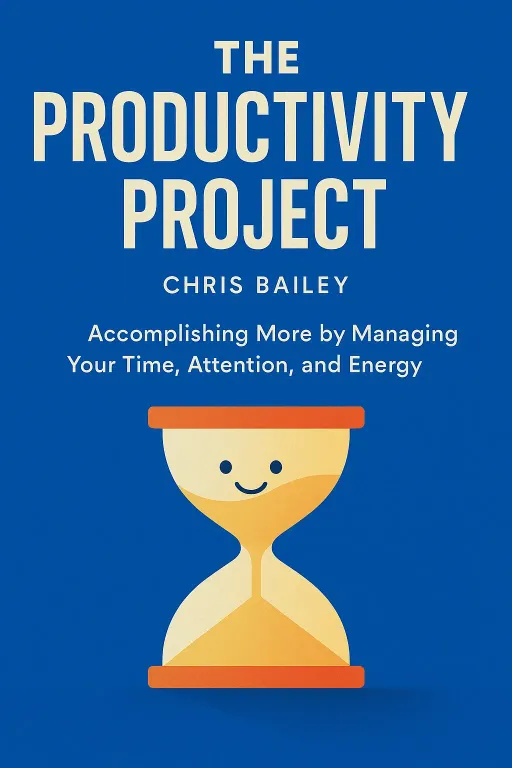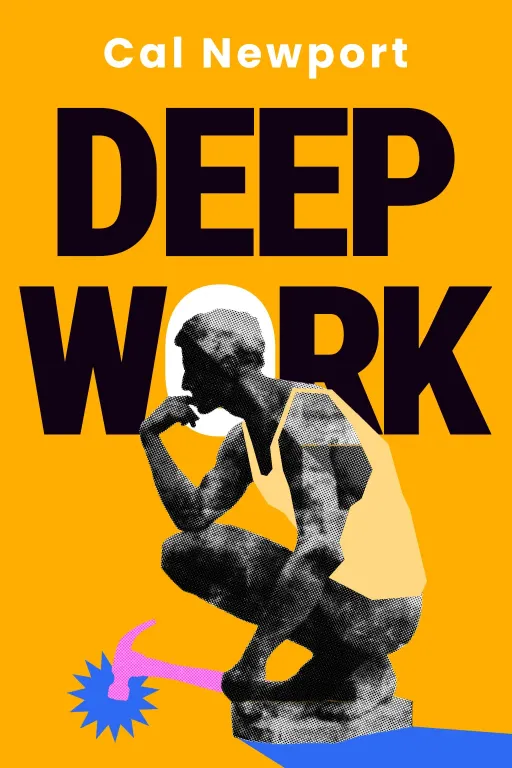
The Productivity Project
9 minAccomplishing More by Managing Your Time, Attention, and Energy
Introduction
Narrator: Imagine graduating from university with two lucrative job offers on the table. For most, the choice would be a difficult but straightforward calculation of salary, benefits, and career trajectory. But for Chris Bailey, the decision was different. He turned both offers down. Instead, he took his modest savings and embarked on a year-long, self-designed experiment he called "A Year of Productivity." He spent twelve months living in near-isolation, conducting deep research, and subjecting himself to a battery of productivity experiments—from working 90-hour weeks to meditating for 35 hours, all to answer a single, obsessive question: What does it truly take to become more productive?
That journey of intense self-experimentation forms the backbone of his book, The Productivity Project. It reveals that our common understanding of productivity is fundamentally flawed. It’s not about life hacks or simply managing the clock; it’s a deeper, more holistic approach to managing our most valuable personal resources.
Productivity Is Accomplishment, Not Busyness
Key Insight 1
Narrator: Early in his project, Bailey made a seemingly logical decision. To maximize his working hours, he cut out his daily meditation practice. The result was the opposite of what he expected. Without that period of quiet reflection, his work became frantic and scattered. He was working more, but accomplishing less. He was busy, but not productive. This experience led him to a foundational realization: in the modern world of knowledge work, productivity is not defined by how many hours you log or how busy you appear. It is defined by how much you accomplish.
The book draws a sharp contrast between the industrial-era factory worker and the modern knowledge worker. For the factory worker, productivity was simple: more widgets produced per hour. There was little room to work smarter, only harder and faster. Today, however, most work relies on intellectual capital, creativity, and problem-solving. In this environment, working on autopilot is the enemy of real achievement. Bailey uses the analogy of a devout monk who meditates all day and a cocaine-fueled stock trader working at a frenzied pace. Neither is truly productive. The monk is too slow to accomplish much, while the trader is too hurried to work deliberately or strategically. True productivity lies in the middle ground: working with intention and focus, fast enough to get things done, but slow enough to ensure you’re working on the right things.
The Three Ingredients of Productivity are Time, Attention, and Energy
Key Insight 2
Narrator: The central thesis of The Productivity Project is that traditional time management is obsolete. Focusing on time alone is like trying to run a car with a full tank of gas but a dead battery and a distracted driver. To achieve meaningful results, one must manage a trinity of interconnected resources: time, attention, and energy.
These three ingredients are inseparable. If you have abundant energy and focus but spend your time on low-impact tasks, you will accomplish little of value. If you have time and energy but your attention is constantly hijacked by notifications and distractions, your work will be shallow and fragmented. And if you have time and attention but are physically or mentally exhausted, you won’t have the fuel to perform at your best. Bailey argues that the most successful and accomplished people are not those with more time—everyone gets 24 hours—but those who have mastered the art of deliberately managing all three of these resources in concert.
Master Your Energy by Aligning with Your Biological Prime Time
Key Insight 3
Narrator: One of the most practical strategies in the book is the concept of the "Biological Prime Time," or BPT. This is the one-to-three-hour window each day when a person’s energy levels are naturally at their peak. For many, this might be mid-morning, a few hours after waking up. For others, the night owls, it could be late in the evening. The key is that this peak time is not for answering emails or doing routine chores. It is the sacred window for tackling your most important, high-impact tasks.
By observing and tracking his own energy fluctuations, Bailey discovered that he could accomplish significantly more by scheduling his most cognitively demanding work—like writing—during his BPT. When his energy dipped in the afternoon, he would switch to lower-impact "maintenance tasks" like responding to emails, running errands, or organizing his files. This simple act of aligning tasks with natural energy levels prevents the common mistake of wasting peak focus on trivialities or, conversely, trying to force complex work when your brain is running on fumes. Managing your day is not just about managing the clock; it’s about managing your energy.
Attention Is a Trainable Muscle, Not a Fixed Trait
Key Insight 4
Narrator: In an era of constant digital bombardment, attention has become our most fragmented and precious resource. The book posits that attention is not something you simply have; it’s a mental muscle that can be trained and strengthened. The most effective workout for this muscle is mindfulness meditation.
To illustrate this, the book presents a scenario similar to that of Alex, a software engineer struggling in a distracting open-plan office. Bombarded by notifications and chatter, his ability to focus on complex code was shattered. He decided to experiment with mindfulness, starting with just ten minutes of practice each morning. Initially, his mind wandered constantly. But by persistently and gently bringing his focus back to his breath, he was training his "attention muscle." Over several months, he noticed a profound change. At work, he became more aware of the moment his attention was being pulled away and found it easier to consciously redirect it back to his task. He was building attentional control. The book argues that single-tasking, disabling notifications, and practicing mindfulness are not just feel-good activities; they are essential training regimens for strengthening the focus required for deep, meaningful work.
True Productivity Requires Self-Compassion
Key Insight 5
Narrator: Towards the end of his project, Bailey’s commitment was put to the ultimate test. While on a brief vacation in Dublin, he slipped on a cobblestone street and shattered his ankle. The injury required reconstructive surgery and a grueling six-month recovery, threatening to derail the completion of his book. He was physically and mentally burnt out, and his meticulously planned productivity system was no longer viable.
This crisis taught him the final, and perhaps most important, lesson of productivity: you must be kind to yourself. Pushing through with brute force would have led to failure and misery. Instead, he adapted. He scaled back his ambitions, focusing on just one or two achievable intentions each day. He leaned on the habits he had already built and celebrated small wins. This experience revealed that productivity is not about perfection or relentless hustle. It is about adapting to your constraints, forgiving yourself for setbacks, and understanding that happiness and well-being are not byproducts of productivity, but essential inputs. Research shows that happier people are more creative, resilient, and energetic. By integrating self-compassion into his routine, Bailey not only recovered but finished his manuscript six weeks ahead of schedule.
Conclusion
Narrator: The single most important takeaway from The Productivity Project is that becoming truly productive is not about adopting a few clever hacks. It is about fundamentally redefining our relationship with our work and ourselves. It requires a deliberate and holistic management of our three most valuable assets: time, attention, and energy. When these three elements are cultivated and aligned, we move beyond mere busyness and begin to accomplish the things that truly matter.
The book’s most challenging idea is that the path to greater productivity often involves doing less, not more. It asks us to have the courage to disconnect, to create empty space in our calendars, to quiet our minds, and to eliminate the unimportant. It leaves us with a critical question: What can you subtract from your life today to make room for what is truly essential?









